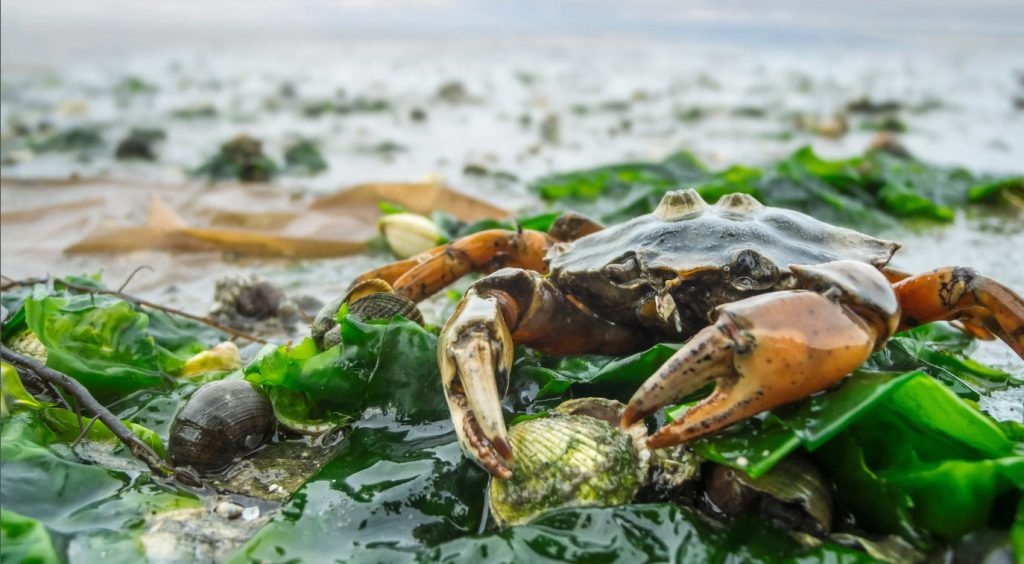
SO WHAT’S THE STORY?
In Autumn 2021, Teesside was collectively shocked by a wave of the most notorious mass marine life die-offs in UK history. North East shores were overwhelmed by lifeless, and dying sea creatures.
What was particularly strange about this occurrence, was that the the deceased were mainly crabs and other crustaceans. Even stranger, some washed-up crustaceans displayed abnormal twitching behaviour. Alarms were raised on a national level. What caused this? Does it remain a threat to the UK’s marine ecosystem? The most dominant theory was that nearby dredging activity had released a toxic chemical called pyridine into the water by dumping toxic sediment from the River Tees estuary into the North Sea.
In January 2023, answers finally came.
DEFRA published an independent expert assessment in which potential causes, such as disease, chemical pollutants and dredging were investigated. Unexpectedly, the report declared dredging as an unlikely cause and instead theorised that either a novel pathogen or an algal bloom was to blame. But things weren’t adding up, algal blooms are indiscriminate killers, so why were only shellfish affected? And if it was a new disease, then why wasn’t it detected in the washed-up tissue samples?

What is an algal bloom and what causes it?
Excess nitrogen and phosphorus cause an overgrowth of algae in a short period of time, also called algae blooms. The overgrowth of algae consumes oxygen and blocks sunlight from underwater plants. When the algae eventually dies, the oxygen in the water is consumed. (from epa.gov)

Something was fishy… or crabby.
Government-independent research from the NEIFCA, Newcastle University, the University of York and the University of Hull have found evidence supporting dredging as the killer, but the government seems eager to rule this out.
Perhaps due to the importance of dredging to develop and maintain the UK’s largest freeport, in which countless wealthy and influential people have a stake. Despite development being entirely funded by public money, Teesworks profits are shared by the STDC (10%) and two developers, Chris Musgrave and Martin Corney (90%). Teesside Freeport offers lower tariffs to businesses importing and exporting goods, and with stakeholders such as Rishi Sunak, Michael Gove and Ben Houchen it becomes apparent that the government and large corporations would suffer a huge economic loss if dredging were to be suspended.
(CC photo by Sharon Webb) The image above was taken by a Teesside resident, showing the devastating numbers of shellfish that were littered across the shoreline.
SO WHAT KILLED ALL THE CRABS?
The true cause of these mass crustacean die-offs is still up for debate, and those affected, or just intrigued, are searching for closure.
Unusually high numbers of crustaceans are still washing up on North East beaches. If dredging is to be ruled out as the cause, then more evidence is needed and further research must be funded. To rule out potential corruption, this report should be fully independent of government influence. Until then, the future of Teesside’s marine ecosystem, and the people who rely on its stability is left uncertain.

(CC photo by Sharon Webb) The image above was taken by a Teesside resident, showing the devastating numbers of shellfish that were littered across the shoreline.
WHY IS THIS IMPORTANT?
The UK’s ocean is home to many crustacean species, from sizeable spiny spider crabs to teeny sand hoppers. Like any other organism, crustaceans play a crucial role in the ocean’s food web. Most species are omnivores and therefore control the abundance of their prey and marine plants. They are also a source of food for predators such as birds, fish and octopuses. After the mass mortality events in the Autumn of 2021, crab and lobster populations massively declined, and this had a domino effect; the entire local ecosystem was affected.
Crustaceans are also a dietary option for us humans and the North East fishing economy relies on populations thriving. Without healthy crab, lobster and mussel populations, the industry is at risk. The livelihoods of locals in the seafood industry have already been hindered, and many worry about their future. Even those without a financial stake in the seafood industry feel helpless, as the ocean is a vital part of their home and no action is being taken by the government to protect it.

THE EXPERTS ARE ON OUR SIDE…
Marine biologists, ecotoxicology and bioenergy experts have been vocal about this mystery since it first arose. From a non-political and purely scientific standpoint, they all agree that the government did not have enough evidence to rule out dredging as the cause of these tragic marine die-offs. Continuing the development of Teesside Freeport, and continuing to dump contaminated sediment into the North Sea without knowing the full risk should be considered a crime against the environment.
WHAT CAN I DO?
Together, we have power! We must create pressure for action to be taken by using our voices, whether on social media or by attending campaign events.
JOIN THE CONVERSATION



